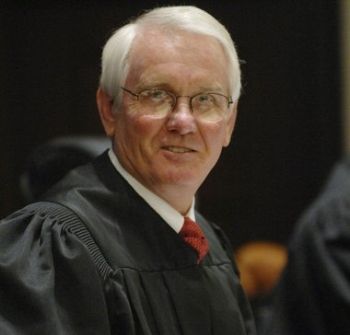
Publisher:
Bonnie King
CONTACT:
Newsroom@Salem-news.com
Advertising:
Adsales@Salem-news.com

~Truth~
~Justice~
~Peace~
TJP
Aug-16-2011 01:07

 TweetFollow @OregonNews
TweetFollow @OregonNews
We Know It Is Unconstitutional, But Thank You
Tamzin A. Rosenwasser, M.D. for Salem-News.comRegarding Judge Roger Vinson’s ruling on Patient Protection and Affordable Care Act
 Judge Roger Vinson |
(ST. LOUIS, Mo.) - The eleventh Circuit Court of Appeals has upheld Judge Roger Vinson’s ruling that the “Patient Protection and Affordable Care Act” is unconstitutional in the case brought by Florida and 25 other states, two private citizens, and the National Federation of Independent Business.
Specifically, it upheld the ruling that the individual mandate is unconstitutional, but did not rule that the bill as a whole is unconstitutional, as did Judge Vinson.
One wonders why the judges are so timorous, especially since the bill lacks a severability clause. Even more fundamentally, as noted by Judge Vinson, James Madison, in The Federalist No 45, specified that the powers delegated to the federal government are few and defined. Those powers, delegated by the people and by the states, do not include interference by the federal government in medical care. As the Tenth Amendment states, “The powers not delegated to the United States by the Constitution, nor prohibited by it to the States, are reserved to the States respectively, or to the people.”
We should note here that the sovereign States created the federal government. The federal government is thus properly the agent of the sovereign states, in carrying out the duties which the powers delegated to the federal government delineate.
As the early Chief Justice John Marshall noted, and as Judge Vinson quotes him; “that those limits may not be mistaken, or forgotten, the constitution is written.” This remains true despite the bloodless coup d’etat carried out by FDR in the 1930s, which fundamentally subverted our constitutional system, and which has led to the morass in which we struggle today.
Congress twisted the Commerce Clause into a pretzel in an attempt to justify forcing 305 million people to buy government-approved health “insurance.” The meaning of “commerce” in the Constitution boils down to the word “trade.” Trades are not forced exchanges. The sole means the government has is force. With force, there is no trade. The major intent of the commerce clause was to prevent barriers to trade across state lines.
Judge Vinson refers to the Wickard v Filburn case, decided in 1942, as “until recently...considered the most far-reaching expansion of Commerce Clause regulatory authority.” Filburn lost the case, which turned on 12 acres too many of wheat grown by Filburn for the government to stomach, and he was penalized.
The Supreme Court stated:
That appellee’s own contribution to the demand for wheat may be trivial by itself is not enough to remove him from the scope of federal regulation where, as here, his contribution, taken together with that of many others similarly situated, is far from trivial.
This is called the “aggregation principle,” the idea that even little things add up to something big.
How about applying it to the government’s constant incursions into our freedom? Some may seem trivial, but, added up, their actions have caused us to lose the freedom that is our birthright, guaranteed to us in our Constitution. The effect of the Filburn decision, of course, is not trivial, as it allows Washington, D.C., to reach down to areas as tiny as 12 acres or even less, and to keep a person from growing his own food. How can anyone cite it without shuddering?
It is only in the wielding of government power that this obsessive concern is warranted, because government operates only by force. Force is the least humane way to treat human beings, and should be used only to prevent unlawful force.
Government has become so accustomed to using force to change Americans’ decisions and behavior that it has become impossible to presume that federal legislation is constitutional. Ms Pelosi derided the question, when asked directly if the health reform bill was constitutional, and James Clymer, another member of Congress, said that a lot of what Congress does is unconstitutional. Under the circumstances, what we need are criminal sanctions for members of Congress and the other two branches who violate their oath of office.
Judge Vinson notes that the defendants themselves state that the law cannot function without the “individual mandate” and that a severability clause was included in an earlier version of the bill, but was removed.
If a law depends on the unconstitutional use of force in order to function, why isn’t the whole law unconstitutional? One hopes the Supreme Court gets rid of this obscene monstrosity, which turns citizens into livestock on a government ranch.
Contact: Yorktown19Oct@aol.com, 765-538-2058
Additional links:
The Doctor's Story: How Obamacare is hurting the patient-physician relationship: http://www.youtube.com/watch?
AAPS lawsuit covered on national TV: http://www.youtube.com/watch?
AAPS Alieta Eck, M.D. testifies to Senate: http://www.youtube.com/watch?
 Author/Contributor: Dr Tamzin Rosenwasser earned her MD from Washington University in St Louis. She is board-certified in Internal Medicine and Dermatology and has practiced Emergency Medicine and Dermatology. Dr. Rosenwasser served as President of the Association of American Physicians and Surgeons (AAPS) in 2007-2008 and is currently on the Board of Directors. She also serves as the chair of the Research Advisory Committee of the Newfoundland Club of America. As a life-long dog lover and trainer, she realizes that her dogs have better access to medical care and more medical privacy than she has, and her veterinarians are paid more than physicians in the United States for exactly the same types of surgery.
Author/Contributor: Dr Tamzin Rosenwasser earned her MD from Washington University in St Louis. She is board-certified in Internal Medicine and Dermatology and has practiced Emergency Medicine and Dermatology. Dr. Rosenwasser served as President of the Association of American Physicians and Surgeons (AAPS) in 2007-2008 and is currently on the Board of Directors. She also serves as the chair of the Research Advisory Committee of the Newfoundland Club of America. As a life-long dog lover and trainer, she realizes that her dogs have better access to medical care and more medical privacy than she has, and her veterinarians are paid more than physicians in the United States for exactly the same types of surgery.
 |
 |
Articles for August 15, 2011 | Articles for August 16, 2011 | Articles for August 17, 2011
Quick Links
DINING
Willamette UniversityGoudy Commons Cafe
Dine on the Queen
Willamette Queen Sternwheeler
MUST SEE SALEM
Oregon Capitol ToursCapitol History Gateway
Willamette River Ride
Willamette Queen Sternwheeler
Historic Home Tours:
Deepwood Museum
The Bush House
Gaiety Hollow Garden
AUCTIONS - APPRAISALS
Auction Masters & AppraisalsCONSTRUCTION SERVICES
Roofing and ContractingSheridan, Ore.
ONLINE SHOPPING
Special Occasion DressesAdvertise with Salem-News
Contact:AdSales@Salem-News.com

googlec507860f6901db00.html



Terms of Service | Privacy Policy
All comments and messages are approved by people and self promotional links or unacceptable comments are denied.
Hank Ruark August 16, 2011 11:32 am (Pacific time)
Stone's last sentence severely limits what one may expect if Colli's last sentence is to take place, requiring some action to prevent such malign corporate interference. Fact is there is no possible way for Colli's suggested actions without some changes in the current Supremes cabal. IF those actions are to be applied it requires precisely the kinds of "reasonable restrictions" and "regulate"-tion of charges and payment schedules sure to sent eager perpetrators flying to Supreme support still more surely and even more rapidly.
Ralph E. Stone August 16, 2011 7:54 am (Pacific time)
As the Sixth Circuit noted, the Supreme Court will ultimately decide whether there is any meaningful limitations on the Commerce Clause. The clause is often paired with the Necessary and Proper Clause, the combination used to take a broad, expansive perspective of these powers. The Court would aggregate the total effect the activity would have on actual economic commerce. Intrastate activities could fall within the scope of the Commerce Clause, if those activities would have any rational effect on Interstate Commerce. And the Supreme Court has ruled that the 10th Amendment was not an independent limitation on Congressional power. Ordinarily, under the extensive past precedent, ObamaCare should be ruled in Commerce, and therefore, Constitutional. However, given the makeup of the present Supreme Court, anything could happen.
COLLI August 16, 2011 6:13 am (Pacific time)
I applaud Dr. Rosenwasser and her common-sense article re: the “Patient Protection and Affordable Care Act”. While I believe that the health care system in the United States is outdated and in need of revamping, forced participation in interstate commerce is not the way to bring the needed change about. We should have learned by now that putting such power in the hands of any administration or the Congress would be foolish and destructive. We would be far better served by putting reasonable restrictions on insurance companies to regulate charges and by establishing payout schedules for specific treatments and procedures. We should also establish severe limits regarding the current dictatorial practices these insurance companies use that result in treatments other than those preferred by the attending physician. When any corporation dictates to the government or to the public, it is time to question their ethics and apply appropriate penalties.
[Return to Top]©2025 Salem-News.com. All opinions expressed in this article are those of the author and do not necessarily reflect those of Salem-News.com.